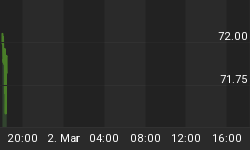The Daily Reckoning PRESENTS: Our resource man, John Myers, ponders what to expect from black gold as "social and political shock waves will be felt worldwide once oil production peaks.
"The country is facing the most serious energy shortages since the 1970s. Without a solution, the energy crisis will threaten prosperity and national security and change the way Americans live." - Spencer Abraham, U.S. Energy Secretary
Here are some facts you should consider when debating whether oil is a profitable investment opportunity. After reading these four bits of information, I'm sure you'll agree there's money still to be made from black gold.
* The United States, with 5% of the world's population, consumes more than one-quarter of the world's oil production.
* The United States is guzzling oil at record rates. In 2004 the United States will consume 7.5 billion barrels of oil.
* U.S. oil production is at its lowest level since the early 1950s and is declining by more than 2% per year.
* Since 1970, U.S. oil reserves have fallen from 50 billion to 20 billion barrels. By the end of this decade, the United States will have less than 15 billion barrels in oil reserves.
For these reasons and then some, my investment advisory, Outstanding Investments, is bullish on oil prices over the short term and throughout the rest of the decade.
In December, OPEC announced that it would not increase its output quotas despite a wellspring of worries regarding the region - specifically the situation in Iraq and the political instability of Saudi Arabia. OPEC's refusal to open the spigots comes at a time when North Sea and Russian oil production is in decline. This coming year Canadian and Chinese oil production will rise, but their output will not nearly offset the decline in the two previously mentioned regions.
Decline in oil production flies into the teeth of rising world oil demand, projected to grow by about 1 million barrels per day in 2004. Roughly one-third of this increase will be the result of increased demand in the United States along with China.
Given these supply and demand numbers, I believe that even if a political calm settles in the Middle East, oil prices will move above $30 per barrel by the second quarter 2004.
During the last two weeks of November, commercial crude oil inventories in the United States fell by nearly 10 million barrels. On the import front, evidence suggests that Middle East exports to Asia are increasing, with the United States importing more oil from Canada and Mexico. America's neighbors are a stopgap for oil supplies, but neither country has the wherewithal to keep the United States flush with oil for any time to come.
Meanwhile, America's rotary rig count, which once totaled more than 5,000 active in the early 1980s, stands just above 700 today. Even with crude oil prices above $28 a barrel, American oil companies have slashed domestic exploration budgets because they understand one fact - America is drilled out.
Since 2000, U.S. oil companies have replenished their reserves by acquiring other oil companies, many of which are headquartered in Canada. These Canadian companies have significant reserves and will continue to provide an expedient solution to America's brewing energy crisis.
In short, I believe U.S. buyouts of Canadian oil and gas companies will continue. And we're looking into more takeover candidates for OI recommendations.
But Canada is not a panacea that will cure America's oil crisis. This was supported by some somber predictions at a November energy symposium in Ottawa, Canada. According to several of the industry's top experts, Canadian and worldwide production of oil and natural gas will peak sometime before 2020.
The only solution, said symposium speakers, will be higher energy prices from the gas pump right on through to household electricity.
University of British Columbia professor Bill Rees, a well-known expert on the world's remaining oil and gas stockpile, predicts that "social and political shock waves will be felt worldwide once oil production peaks."
The consensus is that world production in both conventional oil and natural gas could peak as early as 2017. America's energy crunch could happen much, much sooner.
P.S. A December 2003 Energy Information Administration release states that "without a substantial increase in crude oil imports...it may be difficult to supply enough products for current demand."
Translation: Crude oil, already expensive, will become more costly in 2004 and considerably more expensive during the second half of this decade as domestic production and oil reserves decline.
OI Prediction: We look for crude oil to break above $40 in 2004 even without political or military calamity in the Middle East. In the event of war, social upheaval or armed revolution in the Persian Gulf, oil could spike to $50 per barrel...and maybe even more.















